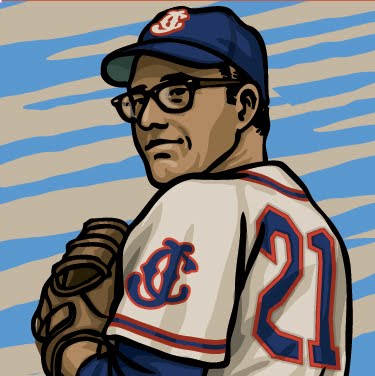
When I first started this blog a little over a year ago, I started receiving many requests for players to be profiled on here and given The Infinite Baseball Card Set "treatment." Out of all the emails I began to notice that it was not one particular player that was asked for the most, but rather a whole ethnic group: Jewish ballplayers. I did cards and stories on here of Sandy Koufax and Moe Berg, but I began slowly researching different players of the Jewish faith, trying to find characters who would fit in with the kind of stories I like to write. Guys with interesting stories who may not be known to the casual fan of baseball history. Mose Solomon was one of those guys, and in fact he appears on page 7 of the Premier Issue of "21: The Illustrated Journal of Outsider Baseball."
By the early 1920’s the owners of all three of New York’s ballclubs recognized the prospective value in finding a viable Jewish star to play for their team. Jews made up a large part of New York’s population and they embraced the National Pastime with a passion. Their loyalty was spread evenly among the three teams and each owner salivated at the thought of discovering a Babe Ruth of the Jewish persuasion which would undoubtedly attract the bulk of the city’s Jewish fans. So imagine the excitement caused when news spread of a Jew from the Lower East Side playing in the minors in Kansas hitting an unheard of 49 home runs in the summer of 1923. Manager John McGraw of the New York Giants, watching his attendance get siphoned away by the Yankees and Babe Ruth, nearly tripped over himself trying to purchase the contract of this gold mine in the making. Before he even made it to the Polo Grounds he was dubbed “The Rabbi Of Swat” by the press. As the train carrying Mose Solomon from Kansas neared New York City, the expectation of a million fans had reached a crescendo.
Born on Hester Street on the Lower East Side, Mose Solomon’s immigrant parents moved the family west to Ohio when he was a kid. Mose and his brothers grew up big and athletic, one brother becoming the boxing champ of Ohio and Mose taking up both football and baseball. He played on the Carlisle Indian School football team that featured Jim Thorpe until he was unmasked as being a Caucasian by a sportswriter. Mose started his professional baseball career in 1921 with the Vancouver Beavers and in the rough and tumble world of the low minors he made a name for himself as a man who would not put up with any anti-Semitism. Unlike many other Jews at the time including his brother Henry, the champion boxer who called himself “Henry Sully”, Mose refused to change his name to a less-ethnic one. It became evident in any place he played that he had no reservations about using his fists to fight back. Mose Solomon was one tough Jew.
It was while playing for the Hutchinson Wheat Shockers in the Southwestern League in 1923 that Mose became a legend. Out of nowhere he pounded 49 home runs, breaking the old record set way back in 1895. By September he was batting .421 and leading the league in doubles, hits and runs scored. News of his feat made newspapers all over the country and that is how John McGraw became aware of what he thought would become the Giants key to financial success. However prodigious his offensive skills were, his defensive abilities left much to be desired. In just 108 games he committed 31 errors covering first base. Even Hutchinson’s management, who would benefit greatly from selling Solomon’s contract warned the Giants about his liability in the field. None-the-less, Giant’s scout Dick Kinsella purchased his contract from the Wheat Shockers and put Mose on the next train east.
The much-heralded “Jewish Babe Ruth” rode the Giants’ bench while McGraw decided what to do. Finally on the last home game of the season, with the crowd yelling for Mose Solomon to take the field, McGraw put him in as a replacement for outfielder Ross Youngs. In the 10th inning with the score tied 3-3 and a runner on second, Solomon slammed a double to drive home the winning run. He played one more game for the Giants that year and all told went 3 for 8, a batting average of .375. Although he was ineligible to play and would not be paid, McGraw wanted Solomon to stay with the team while they played the Yankees in the World Series. Mose knew his family needed money however and declined to stay in New York, choosing to play pro football instead. An insulted John McGraw sold Solomon to Toledo, letting him find out about his demotion by reading it in the newspaper.
Mose drifted around the low minors until 1929, ending his career with a .313 average but his offensive production never again approached his 1923 numbers. Always a liability in the field, Mose Solomon was a designated hitter born way too soon. After baseball he moved to Florida and began a long and successful career as a building contractor.
The Premier Issue of "21: The Illustrated Journal of Outsider Baseball" is finally released and can be purchased by clicking on the tab right below the arrow on the main header of this blog.




No comments:
Post a Comment